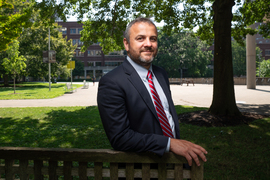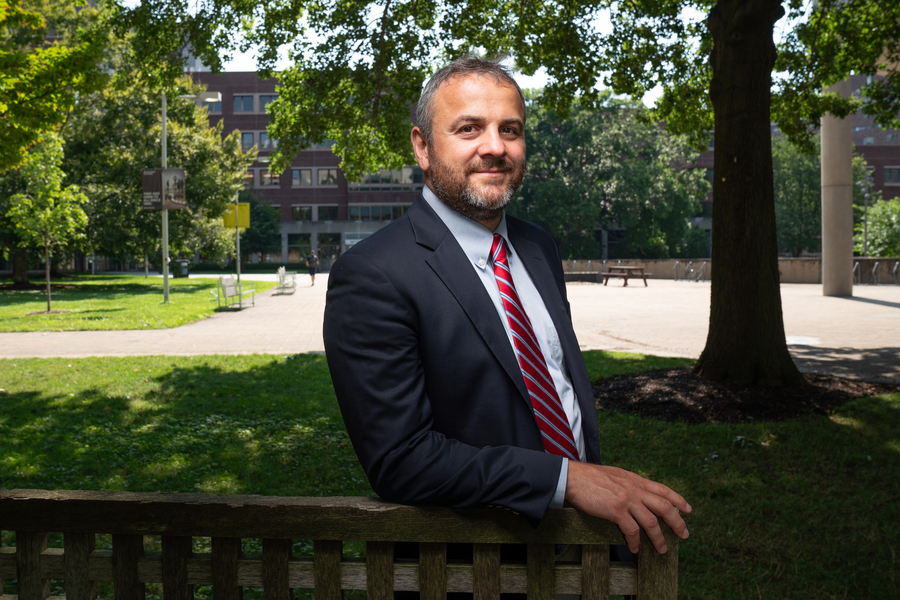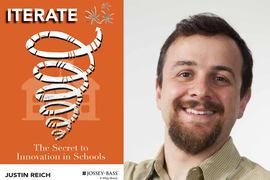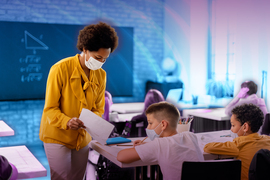Back in 1913 Thomas Edison confidently proclaimed, “Books will soon be obsolete in the public schools.” At the time, Edison was advocating for motion pictures as an educational device. “Our school system will be completely changed inside of 10 years,” he added.
Edison was not wrong that video recordings could help people learn. On the other hand, students still read books today. Like others before and after him, Edison thought one particular technology was going to completely revolutionize education. In fact, technologies do get adopted into schools, but usually quite gradually and without altering the fundamentals of education: a good classroom with good teachers and a community of willing students.
The idea that technology changes education incrementally is central to Justin Reich’s work. Reich is an associate professor in MIT’s Comparative Media Studies/Writing program who has been studying schools for a couple of decades, as a teacher, consultant, and scholar. Reich is an advocate for technology, but with a realistic perspective.
Time after time, entrepreneurs claim tech will upend what they depict as stagnation in schools. Both parts of those claims usually miss the mark: Tech tools produce not revolution but evolution, in schools that are frequently changing anyway. Reich’s work emphasizes this alternate framework.
“In the history of education technology, the two most common findings are, first, when teachers get new technology, they use it to do what they were already doing,” Reich says. “It takes quite a bit of time, practice, coaching, messing up, trying again, and iteration, to have new technologies lead to new and better practices.”
The second finding, meanwhile, is that ed-tech tools are most readily adopted by the well-off.
“Almost every educational technology we’ve ever developed disproportionately benefits the affluent,” Reich says. “Even when we make things available for free, people with more financial, social, and technical capital are more likely to take advantage of innovations. Those are two findings from the research literature that people don’t want to hear.”
Some people must want to hear them: Reich has written two well-regarded books about education, and for his scholarship and teaching was awarded tenure earlier this year at MIT, where he founded the Teaching Systems Lab.
“I’ve spent a substantial portion of my career reminding people of those two things, and demonstrating them again and again,” Reich says.
Optimized like a shark
Long before he made a living by studying schools, Reich pictured himself working in them. Indeed, that was his career plan.
“I wanted to be a teacher,” Reich says. He received his undergraduate degree from the University of Virginia in interdisciplinary studies, then earned an MA in history from the University of Virginia, writing a thesis about the U.S. National Parks system.
Reich then got a job in the early 2000s as a history teacher at a private school in the Boston area. Soon the school administrators gave Reich a cart of laptops and encouraged him to put the new tools to use. Many history archives were becoming digitized, so Reich happily integrated the laptops and web-based sources into his lessons.
Before long Reich co-founded EdTechTeacher, a consulting firm helping schools use technology productively. And his own teaching reinforced a lesson: When larger practices in a discipline change, schools can use technology to follow suit; it will make less difference otherwise. Then too, schools also adapt and evolve in ways unrelated to technology. For instance, we now educate a greater breadth of people than ever.
“You can absolutely improve schools,” Reich says. “And we improve schools all the time. It’s just a long, slow process, and everything is kind of incremental.”
Eventually Reich went back to school himself, earning his PhD from Harvard University’s Graduate School of Education in 2012. At the time, large-scale online college courses were seen as a potentially disruptive force in higher education. But that proposed revolution became an evolution, with online learning producing uneven results for K-12 students and undergraduates while being used more effectively in some graduate programs. Reich examines the subject in his 2020 book, “Failure to Disrupt,” about technologies intended to enhance education at scale.
“Online learning is good for people who are already well-equipped for learning, and those tend to be well-off, educated people,” Reich says. The Covid-19 pandemic also helped reinforce the value of in-person learning. The physical classroom may date to ancient times, but it is a durable innovation.
“Technology gets introduced into educational systems, when it’s possible that the systems are already pretty optimized for what they want to do,” Reich says. Citing another scholar of education, he notes, “Mike Caufield says, ‘We think of schools as old and ancient, but maybe they are in the way a great white shark is, optimized for its environment.’”
Okay, but what about AI?
Reich has now seen many supposed ed-tech revolutions firsthand and studied many others from the past. The latest such potential revolution, of course, is artificial intelligence, currently subject of massive investments and attention. Will AI be different, and fundamentally transform the way we learn? Reich and a colleague, Jesse Dukes, are conducting a research project finding out how schools are currently using AI. So far, Reich thinks, the impact is not huge.
“A lot of folks are saying, ‘AI is going to be amazing! It’s going to transform everything!’” Reich says. “And we’re spending a lot of time with teachers and students asking what they’re actually doing. And of course AI is not transformative. Teachers are finding modest ways to integrate it into their practice, but the main function of AI in schools is kids using it to do their homework, which is probably not good for learning, on net.”
To some degree, Reich suspects, teachers are now devoting more time to in-class writing assignments, to work around students substituting Chat GPT for their own writing. As he notes, “Using in-class time differently to accommodate for changes in technology is something educators have gotten really good at doing over the last decade. This doesn’t seem like a tidal wave crashing over them.”
Reich, again, is not an opponent of technology, but a realist about it, including AI. “A lot of new things are probably helpful in some way, some place, so let’s find it,” he says. In the meantime, schools will be grappling with a lot of hard problems that tech alone will not solve.
“If you’re working at a school serving kids furthest from opportunity in the country, the biggest problem you’re facing right now is chronic absenteeism,” Reich says. “You’re having a really hard time getting kids to show up. AI doesn’t really have anything to do with that.”
Overall, Reich thinks, the key in sustaining good schools is to keep tinkering on many fronts. Educators should “act in short design spirals,” as he wrote in his 2023 book, “Iterate: The Secret to Innovation in Schools,” rather than waiting for radical technology solutions. In education, the tortoise will usually beat the disruptor.
“Improving education is a lot of hard work, and it’s a long process, but at the other end of it, you can get genuine improvement,” Reich concludes.









